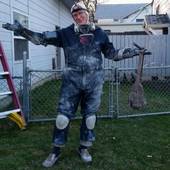What about your smokies- Tips on smoke alarm placement and usage.
Leavenworth Home Inspections
Lets first start with with a little nomenclature, “Smoke Alarm” versus “Smoke Detector”.
Photoelectric Smoke Alarm
Many will use these two terms interchangeably but there is a slight difference. A ”Smoke Alarm” is most common in residential and is a stand alone device with a built in audible source to alarm the occupants of a potential fire. Typically they are hardwired with a battery back up. National Fire Protection Association(NFPA) 72, National Fire Alarm Code, defines a smoke alarm as a single- or a multiple-station alarm that is responsive to smoke.
Smoke detector part of security system
A “Smoke Detector” typically has a built in sensor and is part of of a system such as a security system in residential. They often have an external alarm (horn or strobe) and are connected to a control panel or fire alarm panel. These may send a signal for a fire response or to a control center that will create a response. Smoke detectors are commonly found in more commercial settings such as hotels, hospitals, apartments, dorms and other industrial applications.
So when we are talking about residential structures typically we are referring to “Smoke Alarms”.
Smoke alarms should not remain in service longer than 10 years from the date of manufacture and should be replaced thereafter. You should vacuum the dust off smoke alarms every six months.
There are two main types of smoke alarms-
Ionization smoke detection: is generally more responsive to flaming fires.(Most common type in homes and more prone to nuisance tripping)
Photoelectric smoke detection: is generally more responsive to fires that begin with a long period of smoldering (smoke).
I recommend installing photoelectric smoke alarms due to the fact that most fatalities are attributed to smoke inhalation. If your home is equipped with Ionization detectors at a minimum you should supplement them with photoelectric type of detector.
If the home is not already equipped, smoke alarms are often required to be installed when work requiring a permit is performed (with some exceptions) in older homes. They should be hardwires and interconnected (this can be done by a traveler(wired interconnection) or wirelessly).
Smoke Alarms should be placed in each bedroom (sleeping room/area as the code calls them) and in the immediate vicinity of the bedrooms such as a common hallway. There should be a smoke alarm installed on every floor level.
Placement of the smoke alarm is also important. You should locate them as high as possible typically within three feet of a peak in a vaulted ceiling or within 6 inches of of normal height ceilings.
You should not install them near combustion sources such as fireplaces, space heaters, furnaces, kitchens etc.. And you should avoid problematic air stream and dead space areas such as by kitchens and enclosed stairways.
You should also be careful when placing them by areas that create dampness or humidity such as bathroom (It is recommended to keep them 10 feet away from these areas) and in areas that get too cold or hot (below 40F and above 100F).
Dusty and drafty areas also can hamper their performance, so try to avoid placement by air vents or ceiling fans and dust can cause the alarm to become clogged.
If you live in an area where bugs are a problem you may need a bug screen for the smoke alarm. Don’t forget those fluorescent lights, it is thought that ballast may interfere with the sensor and many now recommend placement anywhere between 1 to 5 feet away from this lighting.
Last but not least you should test them monthly. Yeah I know this may be the hardest item to do but it really is a good practice to get into.
Here is a good document from FEMA on state by state requirements-
http://www.ajfire.org/uploads/smoke_alarm_requirements.pdf
“Education is a progressive discovery of our own ignorance.”
Will Durant
NCW Home Inspections, LLC is a Licensed Washington State Home Inspection service located in Wenatchee Washington serving Chelan County, Douglas County, Kittitas County, Okanogan County and Grant County Washington and the cities of Wenatchee, Leavenworth, Cashmere, Oroville, Cle Elum, East Wenatchee, Quincy and many more…
Your Wenatchee and Chelan Professional Real Estate, Home and Structural Pest Inspection Service.
Instructor- Fundamentals of Home Inspection- Bellingham Technical College
www.ncwhomeinspections.com 509-670-9572
You can follow me on Facebook, Twitter, Google+ and on my website Blog.




Comments(12)